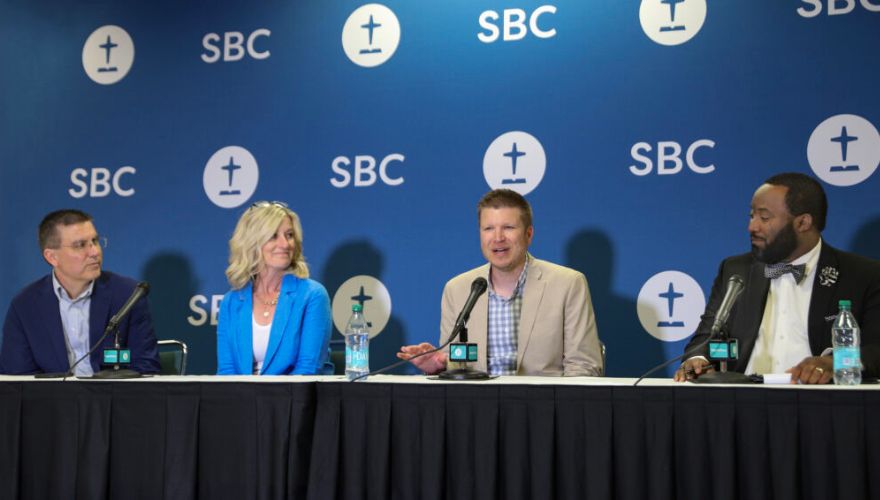
Members of the SBC's Abuse Reform Implementation Task Force (left to right) Brad Eubank, Kris Buckman, Josh Wester and Jon Nelson speak with reporters after delivering their report to messengers June 11 in Indianapolis.
NASHVILLE (BP) — Late last Wednesday afternoon (June 12), the gavel dropped at the 2024 Southern Baptist Convention (SBC) annual meeting in Indianapolis and thus officially ended the service of those on the convention’s Abuse Reform Implementation Task Force (ARITF). However, several weren’t there to see it.
Instead, they were across the street at the FedEx store in the Westin Hotel. For hours, boxes were packed with copies of “Essentials,” the curriculum guiding churches through sexual abuse prevention and response, and shipped to addresses handwritten by Baptist associational leaders.
It was only one of the signals ARITF members witnessed throughout the annual meeting of the desire for churches to strengthen their safeguards and protocols regarding abuse, said ARITF member Brad Eubank.
“The first guy who came to our table said, ‘I need this curriculum for my church, and by the way, I’m a survivor,’” Eubank said of the man who went on to share how his minister of music had abused him. “For four days, we heard those stories, one after the other.” The ARITF had a space in the meeting’s exhibit hall.
The “Essentials” curriculum for guiding churches through sexual abuse prevention and response has received over 1,200 signups online in addition to the 6,000-plus copies distributed last week in Indianapolis.
Launched by the ARITF, Essentials went live on June 9 and revolves around five areas of abuse prevention and response — training, screening, protecting, reporting and caring.
Eubank, senior pastor of Petal (Miss.) First Baptist Church, said the online signups included nearly 600 unique churches. An extra 1,000 thumb drives containing the resource were distributed to churches in addition to those that accompanied each set of materials given out at the annual meeting.
Messengers voted June 11 to adopt recommendations from the ARITF, following the group’s final report to messengers. Those recommendations handed responsibility for overseeing abuse-related priorities to the SBC Executive Committee. The ARITF was formed after the 2022 annual meeting in Anaheim based on the recommendations of the Sexual Abuse Task Force (SATF) and granted an additional year in 2023. The original SATF came into being after the 2021 meeting in Nashville through the will of the messengers.
Indianapolis included many conversations not only with sexual abuse survivors, Eubank said, but with numerous church staff and lay leaders expressing appreciation for the resource.
While praising the materials found within the “Caring Well” curriculum launched in 2019, Eubank pointed to “Essentials” as streamlined to work better with smaller and normative-sized churches.
“We listened to pastors and association leaders, and they said bivocational pastors are working full-time jobs while trying to do funerals, weddings, counseling, hospital visits and everything in between.
“There’s nothing wrong with the resources at churchcares.com and “Caring Well,” but we tried to make this resource as simple and approachable as we could so that the average church could gather five leaders over five months to work through these five essentials,” Eubank said.
The feedback from conversations with church leaders has factored into how “Essentials” gives steps for preparation and response in a situation of abuse.
“We heard a lot of stories [during the annual meeting] from those going through situations right now,” said Kris Buckman, youth and kids missionary at the Baptist Convention of Maryland/Delaware who also served on the ARITF. “People needed advice on a situation, trying to figure out how to deal with it in the right way and the next steps. We were able to point to the book again and again and say, ‘Here, this is what you need to do.’”
The remaining “Essentials” copies were shipped from Indianapolis back to the SBC building in Nashville. Some now-former ARITF members will meet back up in a couple of weeks to send out more shipments. Churches can access the free curriculum at sbcabuseprevention.com/ministry-toolkit/.
In speaking with Baptist Press, Buckman and Eubank both said a national-level, long-term response by Southern Baptists toward sexual abuse is important. However, reform and protection begin closer to the ground.
“The real, generational change is going to come from churches,” said Eubank. “You take this information and implement it. Then you care for those who have experienced abuse.”
(EDITOR’S NOTE — Scott Barkley is national correspondent for Baptist Press.)


